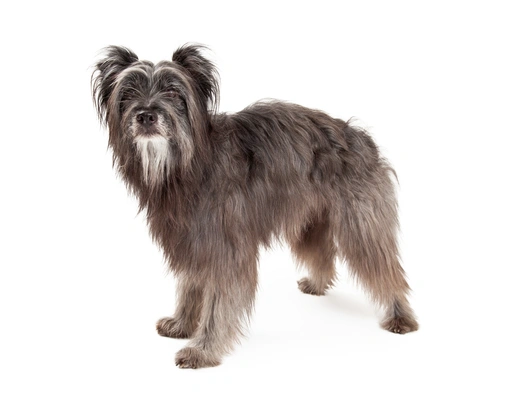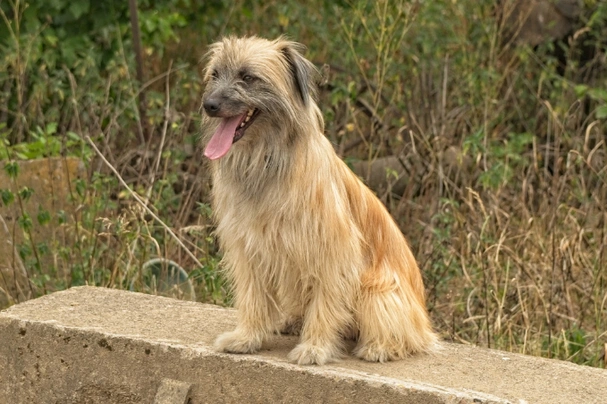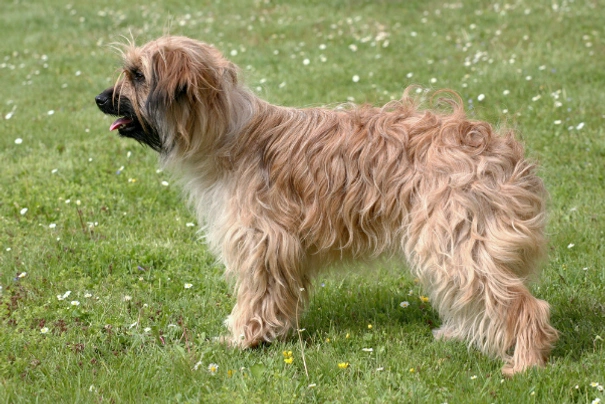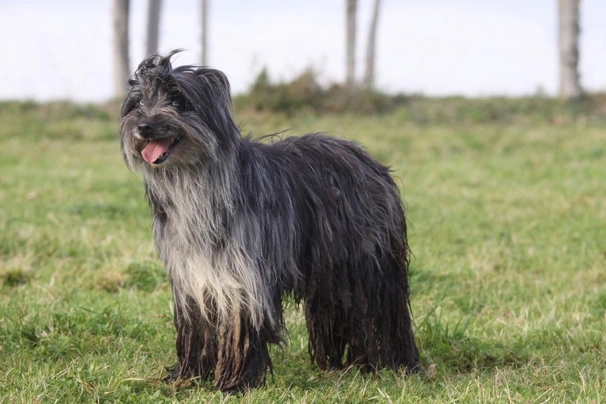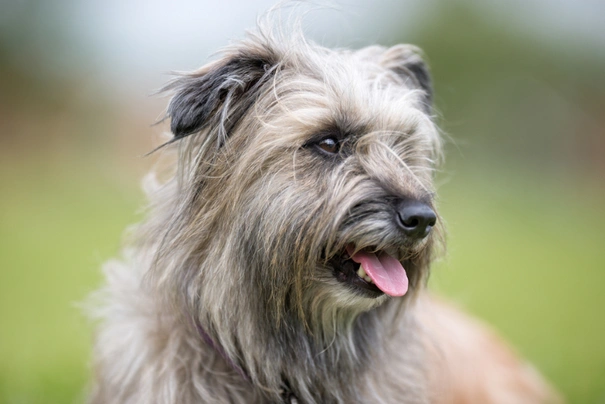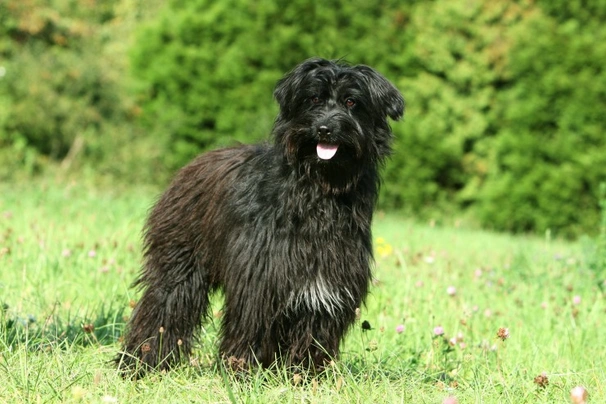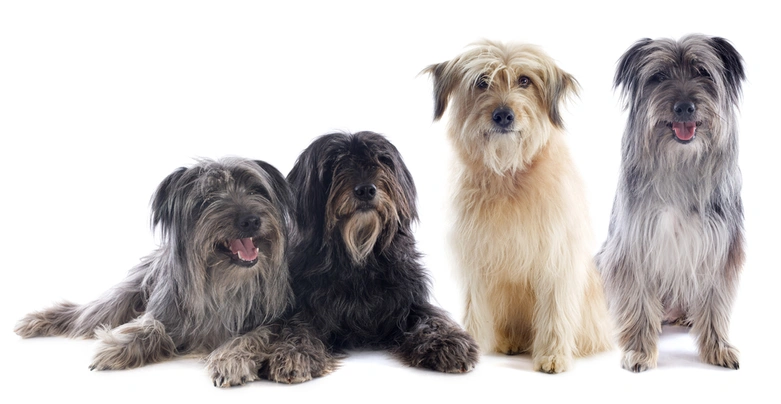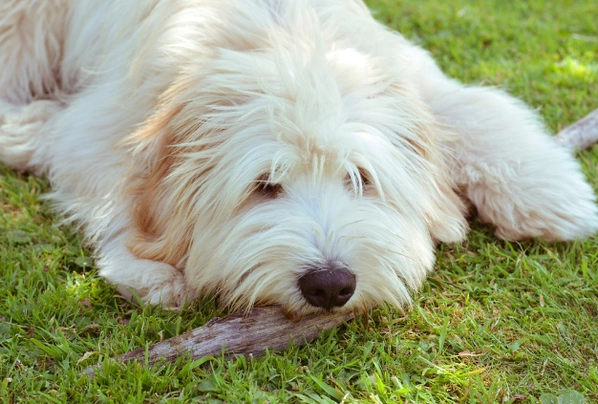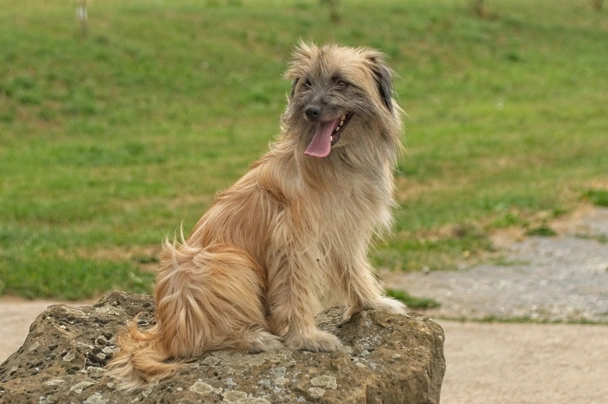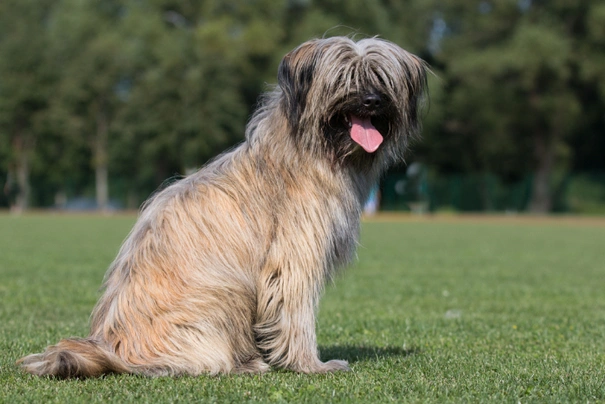Pyrenean Sheepdog
Pros
Cons
Introduction of the Pyrenean Sheepdog
The Pyrenean Sheepdog is a small to medium size dog and one that boast being a loyal and devoted character. They are known to be wonderful companions and family pets although they are high energy intelligent dogs that need to be given the right amount of mental stimulation and daily exercise for them to be truly happy. Although highly prized in France and other European countries the Pyrenean Sheepdog is relatively unknown in the UK although breed numbers are slowly increasing with more people realising just what great companions these dogs can be and more especially for people who lead active outdoor lives.
History of the Pyrenean Sheepdog
Known as Le Berger des Pyrénées in their native France the Pyrenean Sheepdog is among one of the oldest French native breeds. They originate in the mountainous regions of the Haute Pyrénées where they were specifically bred to work challenging terrains herding and guarding large flocks of sheep. They were developed to be quite a bit smaller than other sheepdog types but still have a tremendous amount of stamina. Although one of the oldest breeds the Pyrenean Sheepdog only gained recognition outside of the Pyrenean region of the country at the beginning of the 19th century.
Pyrenean Sheepdogs were used by the French army during the First World War to carry messages and to find injured soldiers. They were also used as valuable guard dogs but this led to their numbers being depleted so drastically that the breed almost vanished forever. Fortunately breed enthusiasts made sure that the Pyrenean Sheepdog was saved from extinction by establishing the Reunion Amateurs des Chien Pyrénées (RACP) in 1922. A few years later in 1926 a breed standard was drawn up by the French Kennel Club and the SCC which has not changed right up till today.
They were developed to be robust and to have a tremendous amount of stamina because they often had to work over challenging mountainous terrains and in extreme weather. They often worked and still do alongside their larger cousins the Great Pyrenees a dog that stood guard while the smaller Pyrenean Sheepdog moved large flocks from place to place.
Pyr Sheps are also thought to be one of the founding breeds in the Australian Shepherd. By the late 20th century these dogs found their way into the hearts and homes of many people thanks to their good looks and kind loyal natures with many International Breed Organisations recognising the Pyrenean Sheepdog as a breed.
They were recognised by The Kennel Club in 1988 and although these charming dogs are gaining a fan base in the UK their numbers remain low. As such anyone wishing to share their homes with a Pyrenean Sheepdog would need to register their interest with breeders and agree to being put on a waiting list but the wait is well worth it.
Interesting facts about the breed
- Is the Pyrenean Sheepdog a vulnerable breed? No although finding well-bred puppies in the UK can be hard and they often command a lot of money
- In France the Pyrenean Sheepdog is called Le Berger des Pyrénées
- They are quite a bit smaller than many other breeds of sheepdogs but they are just as tenacious when they are working
- Pyrenean Sheepdogs can still be seen working large flocks of sheep in their native France
- They are an incredibly keen sense of smell
- They excel at all sorts of canine sports which includes flyball agility Cani Cross and working trials as well as obedience
- Their coats do not need to be trimmed nor do they need to be hand stripped
- A Pyrenean Sheepdog is brave and will stand their ground when they need to
Appearance of the Pyrenean Sheepdog
Height at the withers: Males 40 - 50 cm Females 38 - 48 cm
Average weight: Males 20 - 25 kg Females 14 - 20 kg
The Pyrenean Sheepdog boasts having a dense harsher top coat and a softer denser undercoat with some dogs having short outer coats and others having longer and often corded coats. They are energetic looking medium sized dogs that always seem to have a bit of a windswept look about them and always seem to have a mischievous look about them which is very endearing. They are slightly longer in the body than they are tall at the withers but overall the Pyr Shep is a well-proportioned athletic looking dog.
They have quite triangular shaped heads when seen from above with their skulls being slightly domed and their muzzles tapering nicely to a dog's nose. They only have a slightly noticeable stop and noses are black in colour with wide open nostrils. Their eyes are an almond to oval shape being nicely opened and dark brown in colour although some dogs can have blue or blue flecked eyes if they have a merle coat. However eye rims are always black. They have quite short triangular shaped ears that are fine to the touch being slightly wider at the base and placed neither too far apart or too close on a dog's head. Dogs hold their ears erect with the top half folded forwards when they are excited but laid back when they are resting.
The Pyrenean Sheepdog has a strong jaw with a perfect scissor bite where their upper teeth neatly overlap their lower ones. They have quite long muscular necks that are set well into their shoulders. Their front legs are lean and straight being quite sinewy and boasting single dewclaws. Shoulders are long and nicely angled with dogs having quite prominent withers**.**
They have lean muscular and strong bodies with nicely rounded ribs that extend well back. Their briskets reach down to a dog's elbows. Loins are short slightly arched and strong. Their croups are short and slope gently to a dog's tail which is set quite low. Back legs are strong and well-muscled with well-developed second thighs. Dogs can have either single or double dewclaws. They have quite flat lean oval shaped feet with dark nails and pads which boast having a profuse amount of hair between them. Some Pyrenean Sheepdogs are born with a stumped tail but others have low set long tails that are well covered in hair. Dogs hold their tails higher when alert but lower when resting.
When it comes to their coat the Pyrenean Sheepdog boasts having a long or semi-long coat that's harsh dense flat or slightly wavy with the hair being denser and woollier on a dog's rump and on their thighs. Some longer coated dogs have natural cords. The hair on their muzzle is short but longer on their faces and cheeks but the hair grows away from a dog's eyes and nose giving these dogs their quite unique look. Shorter coated dogs have less fringing on their front legs and below their hocks. The accepted colours for Kennel Club registration are as follows:
- Black
- Black & White
- Blue Merle
- Brindle
- Cream
- Fawn
- Grey
- Slate Blue
It is worth noting that the accepted breed colours for Kennel Club registration can differ from those set out in the breed standard which are as follows:
- Various shades of fawn with some dogs having an overlay of black and dogs can have a small amount of white on their chests and feet
- Light to dark grey – dogs can have white on their heads chests and legs
- Blue merle
- Brindle
- Black
- Black and white
It is worth noting that under the Kennel Club breed standard solid colours are preferred and that large amounts of white or a predominance of white or black and tan colouring is highly undesirable.
Gait/movement
When a Pyrenean Sheepdog moves their strides are quite short. At the trot strides and free and energetic. They have a smooth gait never raising their feet high off the ground. Dogs have a fairly high head carriage at the trot but as they increase speed they carry their heads in line with their backs.
Faults
The Kennel Club frowns on any exaggerations or departures from the breed standard and would judge the faults on how much they affect a dog's overall health and wellbeing as well as their ability to perform.
Males should have both testicles fully descended into their scrotums and it is worth noting that a dog can be a little lighter or heavier as well as slightly taller or shorter than set out in the Kennel Club breed standard which is only given as a guideline.
Temperament of the Pyrenean Sheepdog
The Pyrenean Sheepdog is a very intelligent dog and one that needs to be kept occupied for them to be truly happy well-rounded and obedient characters. They are not the best choice for first time owners or people who lead quieter more sedentary lives. They are however a really good choice for people who lead active outdoor lives and who would like a smart and active canine companion at their side more especially if their work keeps them outside.
It's important for these dogs to be well socialised from a young age so they grow up to be confident outgoing mature dogs. Their socialisation must include introducing them to lots of new situations noises people other animals and dogs once they have been fully vaccinated. It's also crucial for their training to start early too and it must be consistent and always fair throughout a dog's life so they understand what their owners expect of them. A Pyrenean Sheepdog is never happier than when they know their place in the pack and who they can look to for direction and guidance. If they don't know who the alpha dog is in a household they may quickly take on the role of a dominant dog which can make them harder to live with and handle.
Although they form strong ties with all the members in a household the Pyrenean Sheepdog tends to form a strong and unbreakable bond with the person who takes the most care of them. They are naturally suspicious of people they have never met before but rarely would one of these dogs show any sort of aggression towards a stranger preferring to keep their distance until they get to know someone. They are always very quick to let an owner know when something they don't like is happening in their environment which in short means the Pyrenean Sheepdog is a very good watchdog.
Are they a good choice for first time owners?
Pyrenean Sheepdogs are not a good choice for first time dog owners because they must be socialised handled and trained by people who are familiar with the needs of such an intelligent high-energy dog that thrives on having something to do.
What about prey drive?
Pyr Sheepdogs were bred to guard and protects which means they have a high prey drive and will happily take on any animal they feel may be a threat. As such care should always be taken as to where and when a dog can run off the lead more especially if there is wildlife or livestock close by.
What about playfulness?
Pyrenean Sheepdogs have a playful side to their natures and are known to have a mischievous expression about them. Because they enjoy having something to do and are never happy when things are too quiet they will actively seek out something to do for themselves as a way of preventing boredom from setting in.
What about adaptability?
A Pyrenean Sheepdog is better suited to people who have secure well-fenced back gardens a dog can safely roam in whenever possible to really let off stream. As such they are not suited to living in an apartment which could see a dog developing some destructive and unwanted behavioural issues.
What about separation anxiety?
Pyrenean Sheepdogs form strong ties with their families and dogs are never very happy when they find themselves left on their own for longer periods of time. They are better suited to people who either work from home or in households where one person stays at home when everyone else is out so they are never alone for any length of time which could see a dog suffering from separation anxiety. This can lead to them being destructive around the home which is a dog's way of relieving any stress they are feeling and a way to keep themselves entertained which could include barking incessantly to get some attention.
What about excessive barking?
Pyr Sheps are known to like the sound of their own voices a little too much which is something that needs to be gently nipped in the bud when a dog is still young being careful not to frighten them. However even with the best of training some dogs will always bark when the mood takes them or when they want to get an owners attention.
Do Pyrenean Sheepdogs like water?
Most Pry Sheps like swimming and will take to the water whenever they can more especially when the weather is hot. However if anyone who owns a dog that does not like water should never force them to go in because it would just end up scaring them. With this said care should always be taken when walking a dog off the lead anywhere near more dangerous watercourses just in case a dog decides to leap in and then needs rescuing because they cannot get out of the water on their own.
Are Pyrenean Sheepdogs good watchdogs?
Pyrenean Sheepdogs are natural watchdogs which is a trait that’s deeply embedded in their psyche. They are naturally wary of strangers and prefer to keep their distance always standing their ground and voicing an opinion until an owner arrives on the scene.
Intelligence / Trainability of the Pyrenean Sheepdog
The Pyrenean Sheepdog is a very smart dog and a fast learner. The downside to this is they are just as quick to pick up bad habits as they are the good. They need to be well socialised from a young age and their training must begin early too. It also must be very consistent and always fair throughout a dog’s life so they understand what their owner expects of them. Pyrenean Sheepdogs are never happier than when they are given something to do which is why they are so amenable to learning new things.
They excel at many canine sports which includes activities like flyball agility and obedience because they thrive on the attention they are given during their training and the one-to-one contact when they are competing with their handlers. The key to successfully training a Pyrenean Sheepdog is to make their training as interesting as possible and to avoid too much repetition. It's also a good idea to keep training sessions that much shorter which helps keep a dog more focussed on what they are being asked to do bearing in mind that the more intelligent a dog is the faster they get bored.
They do not answer well to harsh correction or any sort of heavy handed training methods but they do respond extremely well to positive reinforcement which always brings the best out of these intelligent and quick-witted dogs especially when there are high value rewards involved.
Like all puppies Pyrenean Sheepdogs are incredibly cute when you and it is all too easy to spoil them when they first arrive in new homes. However as soon as a puppy is nicely settled new owners must start out as they mean to go on. Laying down ground rules and boundaries from an early age helps these intelligent dogs understand what is expected of them. It also helps establish who the alpha dog is in the household. The first commands a puppy should be taught are as follows:
- Come
- Sit
- Stay
- Heel
- Quiet
- Leave it
- Down
- Bed
Children and other
Pyrenean Sheepdogs are known to be very good around children thanks to their gentle placid natures. However because of the can be a little boisterous at times any interaction between toddlers and a dog should always be well supervised by an adult to make sure playtime does not get too boisterous which could end up with someone being knocked over and hurt albeit by accident.
When dogs have been well socialised from a young enough age they generally get on well with other dogs they meet and if they have grown up with a family cat in a household they usually get on well together. However a Pyrenean Sheepdog would think nothing of chasing off any other cats they encounter because they would see them as fair game. Care must be taken when they are around any smaller animals and pets because of their high prey drive as such any contact is best avoided.
Health of the Pyrenean Sheepdog
The average life expectancy of a Pyrenean Sheepdog is between 15 and 17 years when properly cared for and fed an appropriate good quality diet to suit their ages.
The Pyrenean Sheepdog is known to suffer from a few hereditary health issues which are worth knowing about if you are planning share your home with one of these high energy intelligent dogs. The conditions that seem to affect the breed the most include the following:
- Hip dysplasia – dogs should be hip scored through the BVA/KC hip dysplasia scheme
- Patent ductus arteriosis (PDA) – puppies must be screened before being sold
- Progressive retinal atrophy (PRA) – dogs should be eye tested
- Congenital deafness – merle coated dogs should be BAER tested through the Animal Health Trust (AHT)
- Epilepsy
- Sensitivity to Sedation
- Enteritis
- Colitis – due to a sensitivity to certain medication
- Allergies
- Enteritis bought on by food intolerance and Colitis by sensitivity to medication
- Epilepsy
- Luxating patella
- Bloat/gastric torsion
What about vaccinations?
Pyrenean Sheepdog puppies would have been given their initial vaccinations before being sold but it is up to their new owners to make sure they have their follow-up shots in a timely manner with the vaccination schedule for puppies being as follows:
- 10 -12 weeks old bearing in mind that a puppy would not have full protection straight away but would be fully protected 2 weeks after they have had their second vaccination
There has been a lot of discussion about the need for dogs to have boosters. As such it's best to talk to a vet before making a final decision on whether a dog should continue to have annual vaccinations which are known as boosters.
What about spaying and neutering?
A lot of vets these days recommend waiting until dogs are slightly older before spaying and neutering them which means they are more mature before undergoing the procedures. As such they advise neutering males and spaying females when they are between the ages of 6 to 9 months old and sometimes even when a dog is 12 months old.
Other vets recommend spaying and neutering dogs when they are 6 months old but never any earlier unless for medical reasons. With this said many breeds are different and it is always advisable to discuss things with a vet and then follow their advice on when a dog should be spayed or neutered.
What about obesity problems?
As with other breeds some Pyr Sheps gain weight after they have been spayed or neutered and it's important to keep an eye on a dog's waistline just in case they do. If a dog starts to put on weight it's important to adjust their daily calorie intake and to up the amount of exercise they are given. Older dogs too are more prone to gaining weight and again it's essential they be fed and exercised accordingly because obesity can shorten a dog's life by several years. The reason being that it puts a lot of extra strain on a dog's internal organs including the heart which could prove fatal.
What about allergies?
Some Pyr Sheps are prone to suffering from allergies and it's important for a dog to see a vet sooner rather than later if one flares up. Allergies can be notoriously hard to clear up and finding the triggers can be challenging. With this said a vet would be able to make a dog with an allergy more comfortable while they try to find out the triggers which could include the following:
- Certain dog foods that contain high levels of grains and other cereal-type fillers
- Airborne pollens
- Dust mites
- Environment
- Flea and tick bites
- Chemicals found in everyday household cleaning products
Participating in health schemes
All responsible Pyrenean Sheepdog breeders would ensure that their stud dogs are tested for known hereditary and congenital health issues known to affect the breed by using the following schemes:
- Hip dysplasia – dogs should be hip scored through the BVA/KC hip dysplasia scheme
- Patent ductus arteriosis (PDA) – puppies must be screened before being sold through the breed club
- Progressive retinal atrophy (PRA) – dogs should be eye tested
- Congenital deafness – merle coated dogs should be BAER tested through the Animal Health Trust (AHT)
What about breed specific breeding restrictions?
As of January 2013 puppies bred from merle to merle matings can no longer be registered with the Kennel Club because of the health issues associated with the merle gene namely impaired hearing and vision.
What about Assured Breeder Requirements?
The Kennel Club strongly recommends that all breeders use the following tests on their dogs:
- BVA/KC Hip Dysplasia Scheme
- Breed Club - Heart testing for patent ductus arteriosus (PDA) – puppies must be tested before being sold
Caring for the Pyrenean Sheepdog
As with any other breed Pyrenean Sheepdogs need to be groomed on a regular basis to make sure their coats and skin are kept in top condition. They also need to be given regular daily exercise to ensure they remain fit and healthy. On top of this dogs need to be fed good quality food that meets all their nutritional needs throughout their lives.
Caring for a Pyrenean Sheepdog puppy
Pyr Shep puppies are boisterous and full of life which means it's essential for homes and gardens to be puppy-proofed well in advance of their arrival. A responsible breeder would have well socialised their puppies which always leads to more outgoing confident and friendly dogs right from the word go. With this said any puppy is going to feel vulnerable when they leave their mother and littermates which must be taken into account. The longer a puppy can remain with their mother the better although it should never be for too long either.
It's best to pick a puppy up when people are going to be around for the first week or so which is the time needed for a puppy to settle in. Puppy-proofing the home and garden means putting away any tools and other implements that a boisterous puppy might injure themselves on. Electric wires and cables must be put out of their reach because puppies love chewing on things. Toxic plants should be removed from flowerbeds and the home too.
Puppies need to sleep a lot to grow and develop as they should which means setting up a quiet area that's not too out of the way means they can retreat to it when they want to nap and it's important not to disturb them when they are sleeping. It's also a good idea to keep "playtime" nice and calm inside the house and to have a more active "playtime" outside in the garden which means puppies quickly learn to be less boisterous when they are inside.
The documentation a breeder provides for a puppy must have all the details of their worming date and the product used as well as the information relating to their microchip. It is essential for puppies to be wormed again keeping to a schedule which is as follows:
- Puppies should be wormed at 6 months old
- They need to be wormed again when they are 8 months old
- Puppies should be wormed when they are 10 months old
- They need to be wormed when they are 12 months old
Things you'll need for your puppy
There are certain items that new owners need to already have in the home prior to bringing a new puppy home. It's often a good idea to restrict how much space a puppy plays in more especially when you can't keep an eye on what they get up to bearing in mind that puppies are often quite boisterous which means investing in puppy gates or a large enough playpen that allows a puppy the room to express themselves while keeping them safe too. The items needed are therefore as follows:
- Good quality puppy or baby gates to fit on doors
- A good well-made playpen that's large enough for a puppy to play in so they can really express themselves as puppies like to do
- Lots of well-made toys which must include good quality chews suitable for puppies to gnaw on bearing in mind that a puppy will start teething anything from when they are 3 to 8 months old
- Good quality feed and water bowls which ideally should be ceramic rather than plastic or metal
- A grooming glove
- A slicker brush or soft bristle brush
- Dog specific toothpaste and a toothbrush
- Scissors with rounded ends
- Nail clippers
- Puppy shampoo and conditioner which must be specifically formulated for use on dogs
- A well-made dog collar or harness
- A couple of strong dog leads
- A well-made dog bed that's not too small or too big
- A well-made dog crate for use in the car and in the home that's large enough for a puppy to move around in
- Baby blankets to put in your puppy's crate and in their beds for when they want to nap or go to sleep at night
Keeping the noise down
All puppies are sensitive to noise including Pyrenean Sheepdog puppies. It's important to keep the noise levels down when a new puppy arrives in the home. TVs and music should not be played too loud which could end up stressing a small puppy out.
Keeping vet appointments
As previously mentioned Pyr Shep puppies would have been given their first vaccinations by the breeders but they must have their follow up shots which is up to their new owners to organise. The vaccination schedule for puppies is as follows:
- 10 -12 weeks old bearing in mind that a puppy would not have full protection straight away but would only be fully protected 2 weeks after they have had their second vaccination
When it comes to boosters it's best to discuss these with a vet because there is a lot of debate about whether a dog really needs them after a certain time. However if a dog ever needed to go into kennels their vaccinations would need to be fully up to date.
What about older Pyrenean Sheepdogs when they reach their senior years?
Older Pyr Sheepdogs need lots of special care because as they reach their golden years they are more at risk of developing certain health concerns. Physically a dog's muzzle may start to go grey but there will be other noticeable changes too which includes the following:
- Coats become coarser
- A loss of muscle tone
- They can either become overweight or underweight
- They have reduced strength and stamina
- Older dogs have difficulty regulating their body temperature
- They often develop arthritis
- Immune systems do not work as efficiently as they once did which means dogs are more susceptible to infections
- Older dogs change mentally too which means their response time tends to be slower as such they develop the following:
- They respond less to external stimuli due to impaired vision or hearing
- They tend to be a little pickier about their food
- They have a lower pain threshold
- Become intolerant of any change
- Often an older dog can feel disorientated
Living with a Pyrenean Sheepdog in their golden years means taking on a few more responsibilities but these are easily managed and should include looking at their diet the amount of exercise they are given how often their dog beds need changing and keeping an eye on the condition of their teeth.
Older Pyr Sheps need to be fed a good quality diet that meets their needs at this stage of their lives all the while keeping a close eye on a dog's weight. A rough feeding guide for older dogs is as follows bearing in mind they should be fed highly digestible food that does not contain any additives:
- Protein content should be anything from 14 – 21%
- Fat content should be less than 10%
- Fibre content should be less than 4%
- Calcium content should be 0.5 – 0.8%
- Phosphorous content should be 0.4 – 0.7%
- Sodium content should be 0.2 – 0.4%
Older Pyrenean Sheepdogs don't need to be given the same amount of daily exercise as a younger dog but they still need the right amount of physical activity to maintain muscle tone and to prevent a dog from putting on too much weight. All dogs need access to fresh clean water and this is especially true of older dogs when they reach their golden years because they are more at risk of developing kidney disorders.
Grooming of the Pyrenean Sheepdog
The Pyrenean Sheepdog can either have a rough face or a smooth face. Dogs with rough faces can either have a long or moderately long coat and it can be wavy or it can be straight. Smooth faced dogs have a moderately long coat which is harsh to the touch and there is very little undercoat. Dogs that boast long hair can have naturally corded coats. As such the amount of grooming a Pyrenean Sheepdog needs really does depend on the type of coat they have but as a rule of thumb dogs with shorter closer coats are lower maintenance on the grooming front than dogs with longer and corded coats.
A twice weekly brush is needed to prevent any knots and tangles from forming and to keep coats looking tidy although a Pyrenean Sheepdog's coat is naturally "shaggy looking" when the hair is long. They shed little throughout the year only it can be more so during the Spring and then again in the Autumn when more frequent grooming is usually necessary to stay on top of things and to remove dead and shed hair from a dog's coat. It's also important to check a dog's ears on a regular basis and to clean them when necessary. If too much wax builds up it can lead to a painful infection which can be hard to clear up. In short prevention is often easier than cure with ear infections.
Exercise of the Pyrenean Sheepdog
The Pyrenean Sheepdog is an energetic intelligent dog and as such they need to be given the right amount of daily exercise and mental stimulation for them to be truly happy well-rounded dogs. They need a minimum of 1 hour's exercise a day with as much off the lead time as possible. If they are not given the right amount of mental stimulation and exercise every day a Pyrenean Sheepdog would quickly get bored and could even begin to show some destructive behaviours around the home which is their way of relieving any stress they are feeling and not necessarily because they are being naughty.
A shorter walk in the morning would be fine but a longer more interesting one in the afternoon is a must with as much off the lead time as possible. These dogs also like to be able to roam around a back garden so they can really let off steam. However the fencing must be extremely secure to keep these active high-energy dogs in because if they find a weakness in the fence they will soon escape and could get into all sorts of trouble.
With this said puppies should not be over exercised because their joints and bones are still growing. This includes not letting a dog jump up and down from furniture or going up or down the stairs. Too much pressure placed on their joints and spines at an early age could result in a dog developing serious problems later in their lives.
Feeding of the Pyrenean Sheepdog
If you get a Pyrenean Sheepdog puppy from a breeder they would give you a feeding schedule and it's important to stick to the same routine feeding the same puppy food to avoid any tummy upsets. You can change a puppy's diet but this needs to be done very gradually always making sure they don't develop any digestive upsets and if they do it's best to put them back on their original diet and to discuss things with the vet before attempting to change it again.
Older dogs are not known to be fussy eaters but this does not mean they can be given a lower quality diet. It's best to feed a mature dog twice a day once in the morning and then again in the evening making sure it's good quality food that meets all their nutritional requirements. It's also important that dogs be given the right amount of exercise so they burn off any excess calories or they might gain too much weight which can lead to all sorts of health issues. Obesity can shorten a dog's life by several years so it's important to keep an eye on their waistline from the word go.
Feeding guide for a Pyrenean Sheepdog puppy
Puppies need to be fed a highly nutritious good quality diet for them to develop and grow as they should. As a rough guide a Pyr Shep puppy can be fed the following amounts every day making sure their meals are evenly spread out throughout the day and it's best to feed them 3 or 4 times a day:
- 2 months old - 264g to 297g depending on puppy's build
- 3 months old - 334g to 393g depending on puppy's build
- 4 months old - 364g to 435g depending on puppy's build
- 5 months old - 403g to 517g depending on puppy's build
- 6 months old - 440g to 589g depending on puppy's build
- 7 months old - 440g to 590g depending on puppy's build
- 8 months old - 409g to 586g depending on puppy's build
- 9 months old - 381g to 546g depending on puppy's build
- 10 months old - 346g to 510g depending on puppy's build
- 11 months old - 313g to 465g depending on puppy's build
- 12 months old - 311g to 423g depending on puppy's build
- 13 months old - 310g to 420g depending on puppy's build
- 14 months old - 308g to 410g depending on puppy's build
Once a puppy is 15 months old they can be fed adult dog food.
Feeding guide for an adult Pyrenean Sheepdog
Once fully mature an adult Pyrenean Sheepdog should be fed a good quality diet to ensure their continued good health. As a rough guide an adult dog can be fed the following amounts every day:
- Dogs weighing 14 kg can be fed 270g to 353g depending on activity
- Dogs weighing 20 kg can be fed 292g to 382g depending on activity
- Dogs weighing 25 kg can be fed 307g to 409g depending on activity
Pyrenean Sheepdog price
If you are looking to buy a Pyrenean Sheepdog you would need to register your interest with breeders and agree to being put on a waiting list because very few puppies are bred and registered with The Kennel Club every year. You would need to pay anything upwards of £500 for a well-bred pedigree puppy.
The cost of insuring a male 3-year-old Pyrenean Sheepdog in northern England would be £21.67 a month for basic cover but for a lifetime policy this would set you back £43.67 a month (quote as of October 2018). When insurance companies calculate a pet's premium they factor in several things which includes where you live in the UK a dog's age and whether they have been neutered or spayed among other things.
When it comes to food costs you need to buy the best quality food whether wet or dry making sure it suits the different stages of a dog’s life. This would set you back between £30 - £40 a month. On top of this you need to factor in veterinary costs if you want to share your home with a Pyrenean Sheepdog and this includes their initial vaccinations their annual boosters the cost of neutering or spaying a dog when the time is right and their yearly health checks all of which quickly adds up to over £900 a year.
As a rough guide the average cost to keep and care for a Pyrenean Sheepdog would be between £60 to £90 a month depending on the level of insurance cover you opt to buy for your dog but this does not include the initial cost of buying a well-bred healthy Kennel Club registered pedigree Pyrenean Sheepdog puppy.
Buying advice
When visiting and buying any puppy or dog there are many important things to consider and questions to ask of the breeder/seller. You can read our generic puppy/dog advice here which includes making sure you see the puppy with its mother and to verify that the dog has been wormed and microchipped.
Pyrenean Sheepdogs are very rare in the UK which means that well-bred puppies can often command a lot of money. As such with Pyr Sheps there is specific advice questions and protocols to follow when buying a puppy which are as follows:
- Prospective owners may find online and other adverts showing images of adorable Pyrenean Sheepdog puppies for sale. However the sellers ask buyers for money up front before agreeing to deliver a puppy to a new home. Potential buyers should never buy a puppy unseen and should never pay a deposit to a seller before collecting a puppy from them
- As previously touched upon finding a Pyrenean Sheepdog puppy in the UK can prove challenging and they can be expensive. As such some amateur breeders/people breed from a dam far too often to make a quick profit without caring for the welfare of the puppies their dam or the breed in general. Under Kennel Club rules a dam can only produce 4 litters and she must be between a certain age to do so. Anyone wishing to buy a Pyr Shep puppy should think very carefully about who they purchase their puppy from and should always ask to see the relevant paperwork pertaining to a puppy's lineage their vaccinations and their microchipping
- Prospective owners should be very careful when buying a Pyrenean Sheepdog with a merle coat because of the health issues associated with the merle gene and should always verify that parent dogs do not have merle coats bearing in mind that merle to merle matings that produce merle coated puppies can no longer be Kennel Club registered
